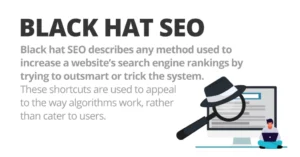Unlocking the shadows: Revealing the untold secrets of black hat social media marketing that will leave you stunned.
Black hat social media marketing refers to the use of unethical and manipulative techniques to gain traction and visibility on social media platforms.
This dark side of social media marketing has been on the rise, raising concerns about its impact on the authenticity and credibility of online interactions.
In this blog, we will delve into the secrets of black hat social media marketing, exploring its practices, consequences, and the ethical debate surrounding it.
Understanding Black Hat Social Media Marketing
Black hat techniques predominantly involve automation, fake followers, spamming, and various forms of manipulation.
These tactics aim to artificially amplify engagement metrics and manipulate algorithms to gain an unfair advantage. Some common examples include:
- Using automated tools to generate likes, comments, and followers
- Purchasing fake followers and engagement
- Spamming social media platforms with irrelevant or promotional content
- Manipulating hashtags and trending topics to gain visibility
These unethical practices violate the established guidelines and policies of social media platforms, as they undermine the integrity and level playing field intended for genuine user engagement. By employing black hat strategies, individuals and businesses risk tarnishing their reputation and facing severe consequences.
The Impact of Black Hat Social Media Marketing
While black hat techniques may lead to short-term gains, they often come with long-term consequences. One such consequence is the erosion of brand trust. When consumers realize that a brand has engaged in deceptive practices to increase its reach and engagement, they are likely to lose trust and loyalty.
Moreover, black hat techniques negatively impact the overall user experience on social media platforms. Automated comments and messages, purchased followers, and spamming can lead to an influx of irrelevant and low-quality content, cluttering user feeds and diminishing the value of genuine interactions.
Another significant concern is the increased risk of online scams, cybercrime, and misinformation. Black hat social media marketing creates an environment where malicious actors can thrive, deceiving users with false information, phishing attempts, and other forms of online manipulation.
Discover the hidden truths of Black Hat Social Media Marketing and unleash the power of ethical strategies to illuminate your online success! [insert link] #SocialMediaMarketing #EthicalMarketing #UnveilTheDarkSide
Debating the Ethics of Black Hat Social Media Marketing
While some argue in favor of black hat techniques, citing speed, affordability, and competitive advantage as benefits, the ethical implications cannot be ignored. Black hat strategies compromise the principles of transparency, honesty, and fairness that should underpin any marketing effort.

The ethical concerns surrounding black hat social media marketing are multifold. Firstly, it creates an uneven playing field where those who resort to unethical practices gain an unfair advantage over competitors who abide by the rules. This kind of competition undermines the integrity and credibility of the marketing landscape.
Secondly, black hat techniques erode the trust that forms the foundation of strong customer relationships. Brands are built on trust, and using deceitful tactics to achieve short-term goals sacrifices long-term customer loyalty.
Thirdly, black hat marketing practices contribute to the digital pollution that saturates the online space with low-quality, irrelevant, and deceptive content. It diminishes the user experience and hampers the ability to create meaningful connections and engagement.
It is important to note that industry experts overwhelmingly condemn black hat social media marketing, advocating for ethical and sustainable practices that prioritize authenticity and transparency.
Legal and Platform Responses to Black Hat Social Media Marketing
As the prevalence of black hat social media marketing continues to grow, legal consequences and platform responses have become increasingly important in curbing these unethical practices.
From a legal standpoint, engaging in black hat techniques can lead to severe repercussions. Platforms continuously refine their terms of service and policies. Businesses and individuals found violating these standards can face penalties like account suspension, legal action, or reputational damage.
Social media platforms themselves have implemented measures to combat black hat strategies. Through the use of algorithms, machine learning, and user reporting systems, platforms can identify suspicious activities and take appropriate action. These measures help to deter black hat practitioners, reduce their impact, and maintain a level playing field for all users.
Alternatives and Ethical Social Media Marketing Practices
Fortunately, there are ethical alternatives to black hat social media marketing. Instead of relying on deception and manipulation, businesses and individuals can focus on building authentic engagement and cultivating long-term success.

One such approach is white hat social media marketing, which emphasizes transparency, authenticity, and the creation of valuable content and interactions. By implementing these principles, brands can build trust, foster genuine connections with their audience, and develop a loyal customer base.
Many successful brands have adopted ethical social media marketing practices and achieved remarkable results. They prioritize creating meaningful and valuable content, engaging with their audience genuinely, and leveraging platforms to facilitate open and transparent communication.
Here are a few practical tips for individuals and businesses looking to adopt ethical social media marketing practices:
- Focus on creating valuable and relevant content that resonates with your target audience
- Engage with your audience authentically, responding to comments and messages with sincerity
- Avoid purchasing followers or engagement; instead, invest in building a genuine following
- Stay updated with social media platform guidelines and policies to ensure compliance
- Collaborate with influencers who align with your values and can help amplify your message ethically
Conclusion
Black hat social media marketing, with its unethical practices, poses significant risks to the authenticity and credibility of the online environment. While some may be attracted to short-term gains, the long-term consequences on reputation, user trust, and overall digital health outweigh any potential benefits.
It is crucial for individuals and businesses to prioritize ethical social media marketing practices that promote transparency, authenticity, and meaningful engagement. By doing so, we can contribute to a sustainable and positive online environment that thrives on trust and genuine connections.







